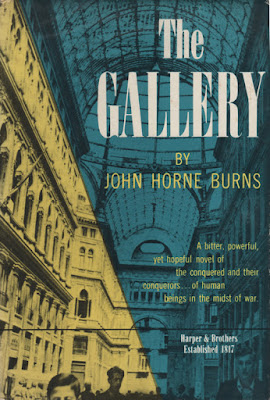 |
| New York : Astor + Blue, 2013 |
Saturday, July 16, 2016
The Medici Boy by John L'Heureux
Wednesday, July 6, 2016
Young Bathers by Georg Pauli
 |
| Young Bathers (1914) Georg Pauli (Swedish, 1855-1935) Nationalmuseum - Stockholm |
Sunday, July 3, 2016
The Gallery by John Horne Burns
 |
| New York : Harper & Brothers, 1947 |
The emotional center of Burns' first novel is the Galleria Umberto, August 1944. At the heart of Naples, with it's bombed out skylights, it is the gathering place for Allied soldiers and Neapolitans trying to survive.
Named The Saturday Review of Literature's best war book of the year, The Gallery is organized into a series of portraits showing the experience of the average person in occupied Naples.
The Gallery reads as a collection of short stories built around a place in time. Momma (the fifth portrait) is often included on lists of pre-Stonewall literature due to it's overt gay content. The owner of the bar where gays, and to a lesser degree, lesbians gather is owned by an Italian woman, they affectionately call Momma. What's unique about the story is that it incorporates all types and the fact that everyone is gay doesn't mean that there isn't overt racism and xenophobia among the soldiers for which Naples is not home.
It would be a mistake, however, to read Momma as a standalone piece, since it's power resides in it's inclusion within the larger work. The Gallery paints a picture, not of The Greatest Generation, but of soldiers who bring their own prejudices to a situation they never wanted to be in.
Bibliographies & Ratings: Cory (IV [Momma]); Garde (Primary, *** [Momma]); Mattachine Review (IV [Momma]); Young (522)
Bibliographies & Ratings: Cory (IV [Momma]); Garde (Primary, *** [Momma]); Mattachine Review (IV [Momma]); Young (522)
Subscribe to:
Comments (Atom)